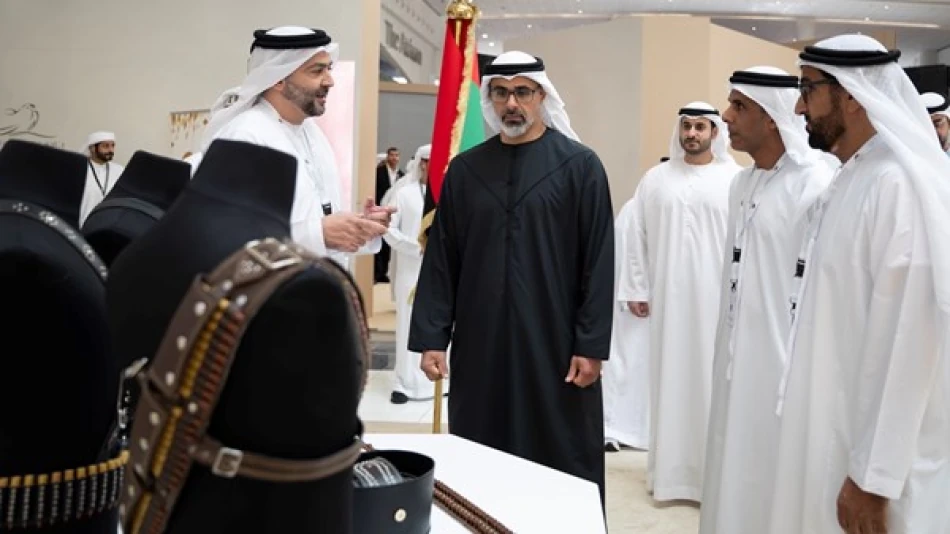
Abu Dhabi Crown Prince Visits International Hunting and Equestrian Exhibition
Abu Dhabi Crown Prince Champions Cultural Heritage as UAE Balances Tradition with Modern Innovation
Sheikh Khaled bin Mohamed bin Zayed Al Nahyan, Crown Prince of Abu Dhabi, visited the 22nd Abu Dhabi International Hunting and Equestrian Exhibition, signaling the UAE's strategic commitment to preserving cultural heritage while embracing technological advancement. The exhibition, running until September 7, represents the largest edition since its inception in 2003, attracting over 2,000 companies from 68 countries and highlighting the UAE's growing influence as a cultural and economic hub.
Strategic Vision: Heritage as Economic Driver
The Crown Prince's visit underscores Abu Dhabi's broader economic diversification strategy, where cultural heritage serves as both identity anchor and revenue generator. Unlike many Gulf states that have struggled to balance modernization with tradition, the UAE has positioned cultural preservation as a competitive advantage in attracting tourism and investment.
During his tour of the exhibition, organized by ADNEC Group in collaboration with the Emirates Falconers Club under the theme "Renewing Heritage," Sheikh Khaled examined cutting-edge equipment and technologies across 15 specialized sectors including falconry, hunting, equestrian sports, traditional arts, handicrafts, camping activities, and environmental conservation.
Technology Integration: A Calculated Approach
The Crown Prince specifically highlighted initiatives that merge modern technology with traditional practices—a approach that distinguishes the UAE from regional competitors. This technological integration represents more than cultural preservation; it creates new market opportunities in heritage tourism, luxury experiences, and specialized equipment manufacturing.
The exhibition's emphasis on environmental conservation alongside traditional hunting and falconry reflects growing global pressure on heritage practices to demonstrate sustainability. This positioning allows the UAE to maintain cultural authenticity while addressing international environmental concerns that could otherwise limit tourism and investment flows.
Market Implications and Regional Competition
The exhibition's growth trajectory—from a regional event to attracting 2,068 companies from 68 countries—demonstrates the UAE's success in creating scalable cultural platforms. This model contrasts sharply with Saudi Arabia's more centralized Vision 2030 cultural initiatives and Qatar's focus on sports-driven cultural diplomacy.
For investors and businesses, the UAE's heritage sector represents an undervalued opportunity. The country's ability to commercialize traditional practices while maintaining authenticity creates sustainable revenue streams that extend beyond oil dependency. The falconry industry alone generates millions in equipment sales, training services, and tourism revenue.
Government Strategy: Soft Power Through Heritage
The high-level government representation at the exhibition—including officials from Abu Dhabi's Culture and Tourism Department and Heritage Authority—indicates coordinated policy support. This institutional backing provides market confidence for businesses investing in heritage-related sectors.
The Crown Prince's emphasis on heritage as "a fundamental pillar for strengthening national identity values for present and future generations" signals long-term government commitment, crucial for businesses planning multi-year investments in cultural infrastructure and programming.
Global Context and Future Outlook
The UAE's heritage preservation model offers lessons for emerging economies seeking to monetize cultural assets without compromising authenticity. Unlike European heritage tourism, which often relies on historical sites, the UAE focuses on living traditions that can evolve and adapt.
The exhibition's international scope—attracting participants from 68 countries—positions Abu Dhabi as a global hub for heritage-related commerce. This creates network effects that benefit local businesses and establish the UAE as a standard-setter in cultural preservation practices.
The strategic integration of heritage preservation with economic development represents a sophisticated approach to cultural diplomacy that strengthens the UAE's position as a regional leader while creating tangible business opportunities across multiple sectors.
Most Viewed News

 Layla Al Mansoori
Layla Al Mansoori






